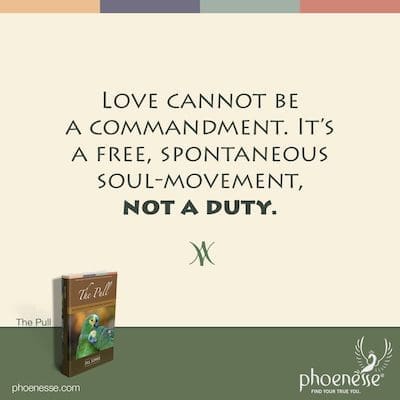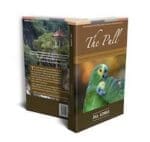As all psychologies and philosophies agree, love is the key to feeling fulfilled; it brings security and fuels our growth. Where there is no love, we will find disharmony, a result of not living in reality. Love, however, cannot be a commandment. It’s a free, spontaneous soul-movement, not a duty. The more people try to love to be obedient or because their conscience demands it, the less they love; the vicious circle closes. Where love does exist though, there will be fulfillment. Said another way, when we experience a lack of fulfillment, it’s a sure sign that our soul hasn’t yet learned to love. This is a simple equation that we often overlook.
Let’s look more closely at love and how we can obtain this greatest key to life—not by taking marching orders from our intellect telling us to follow artificial, superimposed commands, but by following our heart.
We need to be standing on the substantial soil of reality and courage for love to flower. So we need to be without fear, distrust or illusion, to be capable of love. Only then will we have successful relationships. Only when we are present with what is—in alignment with reality—will we intuitively know when it is appropriate to trust and when it is not. We will be able to accept our loved ones as they are, adjusting our own feelings to whatever the reality is. We won’t need to grope in the dark, half-trusting and half-distrusting, tossed about between our fears and our needs.
Where love is lacking, we are in confusion, and conversely, where we’re confused we aren’t able to love. Love, however, manages to smooth all conflicts. We’ll be able to walk solidly along the line between aggression and self-assertion. We won’t be confused by the difference between submissiveness and willful domination.
We’ll assert our rights against unjustified demands, without resorting to hostility. We will avoid compliance when it would be destructive but not be driven to stubborn rebelliousness. Concession won’t need to seem humiliating or like caving in.
It is only through love that we can find just the right balance between the precariousness of opposite extremes. The loving heart knows how to do this, but when we strive to reach the golden mean by way of mere intellectual understanding, it eludes us. No matter how hard we try.
With love, we’ll also have physical health, which is a vital requirement for human life. Since love purifies, wherever it exists, good health must as well. To the degree love is lacking, with negative emotions running rampant—especially for a long time—ill health will prevail. Further, we’ll find that loving and having feelings of self-confidence are inevitably intertwined.
Wow, so who wouldn’t want to love? And yet this universal key—loving—is so hard for us to use. There is nothing we shy away from more than allowing ourselves to love. What are we afraid of? Why does loving seem like such a risk? Is it really so dangerous, so threatening, so irrevocable? Nothing could be further from the truth.
But here we go, building elaborate fences inside ourselves to flee behind. We flee from involvement; we flee from facing our faults; and we flee from seeing our own destructiveness. But mostly we flee from loving. In the end, this is what causes all our other ills.
Our resistance to loving cascades from two basic misunderstandings. First off, we misinterpret reality; we get caught by our illusions. Illusions always produce confusion, which is closely followed by a whole host of other crap like fear, hostility, separateness, depression, self-pity, ambivalence and vindictiveness. No surprise, it’s impossible to love when we’re tripped up in any of these. If however, our values and perceptions were in lockstep with reality, fear of loving would be unthinkable.
Secondly, we underestimate ourselves and are then left with the consequence of feeling inferior. This sounds almost paradoxical. On the surface, it would seem possible to love even if we don’t think much of ourselves. And yet, it just isn’t so. For if we don’t perceive ourselves in reality, we can’t possibly perceive the other as real. By dint of our feeling helpless, weak and inadequate, others assume the role of giants we must defend ourselves against.
Our defenses show up in the form of rejecting, resenting and despising others, which—here’s a shocker—they can sense. What doesn’t occur to us is to sense their vulnerabilities—to realize that others too have human needs. As such, their reality—their strengths and weaknesses—become colored and distorted; both seem like hostile elements to us personally. The long and short of it is, our underestimation of ourselves forces us to become hostile toward others, even if we try to camouflage this with outer submissiveness, hoping it looks like lovingness. Thinking so little of ourselves, we don’t value how important our actions or reactions are to others.
So these two interrelated tendencies—underestimating ourselves and misinterpreting reality—create barriers to loving and make it seem dangerous, which is why the human heart is so timid and reluctant to love. Being overcautious only adds to our withdrawal into isolation. Many of us are half-willing, but this mostly denies love rather than halfway affirming it; we set conditions using a ton of if-ands-or-buts.
With all our illusions and confusions and distorted perceptions, lack of love is a total downer for fair self-evaluation. More disharmony and disturbed reactions are sure to follow. All this creates a tangled ball of disturbed emotions that forms a nucleus, like a foreign body, in our soul.
In our original, untainted nature, our spiritual selves knew nothing of these disturbances. Our nature has always been about love, abundance, productivity and meaningful growth. We, in our natural state, are infused with wisdom derived from an accurate perception of reality. But this foreign body in our soul, this nucleus of distorted perceptions, blocks us from our natural state—the state we are born to express.
We sense this foreign body and want to be rid of it. But we fight in all the wrong ways. Our struggle, tragically, is just the opposite of what might help us eliminate it. We may sense its existence but can’t muster the courage to do what full acknowledgement would entail. We struggle by denying it and running away.
This foreign body doesn’t need to be denied; we do this because we don’t know how to apply the teachings about truth and love. So instead of ridding ourselves of it, we load more foreign matter over the original soul substance. Our denial creates more misery than our admission that it exists would.
So there is another way we can go—another door to the truth that will set us free. All we ever needed to do was examine the foreign body more closely and reveal the reason it has come to be. Instead we act as though it doesn’t exist. Why do we find it so hard to acknowledge this foreign body? It’s partly our fear that others will find fault with us and reject us. It’s also partly our fear that this foreign body is who we are:the ultimate me.In a way, this makes sense. At this stage of the game, our only feelings of love—our generosity, unselfishness and kindness—come from the veneer of feelings we have superimposed over the foreign body. It’s only a thin little layer that’s trying to assure us we’re good and decent people.
We’ve got this faulty sense of our own goodness that doesn’t stand us on firm footing about our reality; we haven’t discovered the genuinely good and loving nougat at our center. Without that, we dare not acknowledge the opposite of our goodness by admitting to the presence of this foreign body, which is foreign to our real nature. So on and on we struggle.
From the vibrant live center of our being we hear a natural response of “I want to,” rather than a stilted “I should.” Our unfettered “want to” feels free and utterly right. It comes from the true self which has been covered by layers of foreign substance. Our true self is the well from which our loving intelligence flows spontaneously; it’s where conflict-free fulfillment waits.
We have to be willing to strip off our layers of pseudo-goodness to get to it. But we fear that under our schmaltzy pretenses is nothing but the opposite of love. We don’t know there’s a reality beyond that. This is why we can’t experience the truth of our own goodness—our genuine lovingness and generous nature.
Going in means taking some risks. We need to discover for ourselves that this foreign body isn’t who we really are. We need to see that our denial of it is the cause of so much misery. Ultimately, we want to move past it to the promised land underneath.
Only be taking stock of the ways in which we don’t love will we feel our love. By painstakingly revealing our selfishness, we’ll become convinced that this is not all of us. Our potential for giving love is unbounded; we’ll need the courage to find this.
We start by reaching out with a loving spirit, wanting to know the truth of who we are more than anything else. Every day, we can sift through our reactions to any disharmony. Because if there’s a disharmony, somewhere there’s a misinterpretation of the truth. We can pray to be in truth as we sit calmly in meditation. Our prayers will not be answered with a stone.
Over time, our victories over our fearful resistance will become living proof of what it feels like to live from the center of our being. We will become less and less obstructed than ever before. From the belly of our being—through our solar plexus—will flow a new wisdom and strength, a new peace and an amazing vitality. We will know a fearless love for all creation and a deep sense of security. We will understand ourselves and others, allowing our soul-movements to flow with the rhythm of the universe.
As we learn to love, we will open to experiences of bliss. We will acknowledge our present state, whatever it is, and not run away from it. When we are in truth in each moment, we will be in peace, regardless of how much disturbance remains to be eliminated.
The problem has never been the problem itself, or the conflict, or even the misconception that created the turmoil. The big problem is our running away from ourselves. It is so very hard on our souls to stay in the dark.
If we can remember these words, we will take up our struggles in a whole new way. Our work will move from self-righteous trying to a more effective connection with reality. Best of all, we will find ourselves closer to loving.
Return to The Pull Contents
Next Book: Pearls




